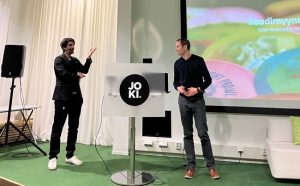Kestävän kehityksen taidot kuten kriittinen ajattelu, luova ongelmanratkaisu ja vastuullisuus auttavat selviytymään muuttuvassa maailmassa viheliäistenkin ongelmien keskellä. Media-alaa opettavilla korkeakouluilla…
Kirjoittajat
Sharing knowledge as a sustainable leadership practice in a virtual team
Working virtually in multidisciplinary and multicultural teams is constantly increasing. Even those professionals who could work face to face want to continue working from home all or part of the time due to the flexibility. The same applies to students and student teams at HEIs. The increase in virtual project work has highlighted the importance of sustainable leadership skills (e.g., knowledge sharing) in virtual teams (VTs), where the team members come from different cultural backgrounds, represent different professional groups, and speak different languages.
Learning in real-life virtual projects at HEIs leads to improvements in professional and teamwork skills. However, some challenges exist, for example, in virtual environments´ activities aiming to improve sustainable leadership in teamwork are not always fully integrated into the real projects and projects lack the authenticity necessary to demonstrate to students the benefits of sustainable leadership.
Anna Eklund, an MBA student at Turku UAS, examined in her thesis the teamwork in a multicultural and multidisciplinary project team through the lenses of sustainable leadership practices. Among these practices, the focus in this study will be on knowledge sharing, which is considered to be the most interesting factor when studying virtual project teams with the focus on the HEI learning context.
This study addressed the following research question:
How is knowledge sharing experienced in a multicultural and multidisciplinary virtual team?
Sustainable leadership
Sustainable leadership is a process that aims to create not only social and environmental responsibility, but also long-term well-being. Sustainable leadership aims to increase profitability, resilience and accountability as outlined in Avery and Bergsteiner’s (2011, 4–5) model of sustainable leadership. The pyramid consists of four levels: foundation practices at the lowest level, higher-level practices, key performance drivers and performance outcomes at the top of the pyramid.
The pyramid is dynamic in all directions and all practices influence each other. The pyramid enables the practices to be applied in various contexts. In this study, the focus is on knowledge sharing, which is one of the higher-level practices of the pyramid of sustainable leadership.
Knowledge sharing and communication in virtual teams
The sharing and creation of knowledge in virtual teams takes the form of communication and interaction. The lack of face-to-face interaction, ineffective communication, and the difficulty of establishing trust and relationships can be seen as a common challenge for virtual teams.
Effective communication is a significant factor in the success of virtual teams. Cultural, linguistic, and professional diversity enriches communication in virtual teams by bringing in different perspectives, but diversity also poses challenges to communication.
In multicultural virtual teams, language skills when using English as the lingua franca can prevent team members from sharing task-related information. However, the awareness of language differences can also improve the quality of knowledge sharing, as knowledge sharing participants were found to put in more effort during the interaction, which improved knowledge sharing outcomes.
Also, geographical and cultural distance can be considered one of the key barriers to sharing information in virtual teams. Differences in values and norms within a team can lead to cross-cultural misunderstandings that slow down knowledge sharing. However, in virtual teams, cultural diversity is also believed to broaden the perspective and knowledge available, thus increasing team creativity.
During the stages of team development and project work, the team’s own culture is also formed. In this case, the importance of the team’s own culture may become more important while the importance of the national culture takes a back seat.
Moreover, professional diversity may have an impact on communicating task-related knowledge. Sometimes, it may also lead to social isolation of team members. On the other hand, it is suggested that the diverse professional knowledge of team members provides extra value to innovation outcomes and positively influences team performance.
The use of versatile ICT can be seen to improve team effectiveness and the relationship and commitment between the individuals in the team. Also, creating common rules at the beginning of teamwork has a positive effect on knowledge sharing.
Knowledge sharing in international sustainable management courses
Data collection
The present study is carried out as a qualitative case study. The data for the study consist of the students´ individual learning diaries (N=36) in two sustainable management course pilots. These courses were co-created as part of the Erasmus funded TOO4TO project (Sustainable management; Tools for tomorrow). Among the 2-credit courses were a virtual sustainability-related group assignment carried out in virtual teams of 4-5 HEI students. Each team consisted of students with different professional, cultural and linguistic backgrounds representing each TOO4TO project partner country (Poland, Germany, Lithuania and Finland). The data were analysed using the thematic approach of content analysis.
The first pilot took place in spring 2022 and the second pilot took place one year later in spring 2023. Altogether, 14 diaries were available for analysis from the first pilot as were another 22 from the second pilot. The reflection diaries included thoughts and experiences on virtual teamwork and knowledge sharing.
Diversity as a positive asset in knowledge sharing in virtual teams
The results show that students reflected cultural and professional diversity in their diaries. In addition, interaction, rules and feeling safe were the most discussed thematic areas.
Table 1 Knowledge sharing and communication in virtual teamwork.
Subject |
Theme |
Experience |
| Knowledge sharing | Cultural diversity | Broader perspectives and more knowledge and creativity available. |
| Professional diversity | Diversity of values and attitudes, and increased capacity for innovation. | |
| Teamwork and communication | Interaction between people | Creating rules for cooperation |
| Organising meetings to improve teamwork | ||
| Feeling safe and valued | Building trust between team members. |
In this study, cultural diversity was perceived to have a strong impact on broadening perspectives and available knowledge as well as increasing team creativity. Cultural diversity led team members to look at issues from a new perspective and helped them to accept the opinions of others. In other words, cultural diversity was mainly seen to enrich communication. Several studies have highlighted the strengthening of the team’s own culture as teamwork progresses. However, the present study did not find a similar result; the emphasis on the team’s own culture was perceived as weak and could not be seen to have played a major role in information sharing. The reasons for this may include the task-oriented nature of the students or the short duration of the project.
In multicultural virtual teams, the lack of a common language can prevent team members from sharing task-related information. In this study, linguistic diversity was not perceived to hinder task-related knowledge sharing, nor were language differences perceived to improve the quality of knowledge sharing. In this study, the HEI students in the virtual teams and their English-language skills can be assumed to have all been at a fairly good level. This may be one reason why there were no perceived barriers to information sharing.
Professional diversity was perceived as having a strong impact on the diversity of values and attitudes, and thus increasing the capacity for innovation. Previous research also shows that team members use complementary, collective knowledge to achieve higher levels of innovation by evaluating, assimilating and applying new knowledge. At the same time, a deep level of diversity in values and attitudes has been found to lead to reduced creative ideas, which was not experienced in this study.
Concerning interaction, a significant number of expressions which ”created rules for cooperation” emerged from the data. Creating tools for collaboration was perceived as useful and, for example, the use of Team Canvas – a tool to organise team alignment, resolve conflicts and build productive culture – opened the way for discussion and sharing of opinions and ideas in the early stages of team formation when the team members did not yet know each other.
Also, organisation of face-to-face or virtual informal meetings was seen as important to improve teamwork. Due to the nature of virtual teams, face-to-face meetings are often difficult to organise, so teams should invest in organising regular virtual meetings. Trust in virtual meetings was perceived to be hampered and team members’ absences and poor connectivity, among other things, made it difficult to organise virtual meetings. However, informal meetings were not organised in the teams studied, which could be due to the tight schedules of the students (combining studies and work) and low motivation.
Feeling safe and valued was also identified as a strong theme in the students´ reflections. Building trust between the team members was perceived as important, and the process of adapting to a diverse team also facilitated the sharing of opinions and ideas.
Tips for teachers
Knowledge sharing is a significant practice from the viewpoint of sustainable leadership and the most important factor in the success of virtual teams. Based on the results, some issues worth noting for the organisation of virtual collaboration for higher education students are presented:
- cultural and professional diversity enrich virtual team communication by bringing together different perspectives
- the virtual student teams should be motivated to have informal meetings to support the development of a sense of feeling safe and to minimise the risk of isolation
- the student teams should be encouraged to create common rules for teamwork to ensure fluent knowledge sharing and communication
- in order to allow for the development of knowledge-sharing skills, the real-life project course should be longer in duration and larger in extent than 2 ECTS. This will also increase the authenticity of the learning in real-life projects at HEIs.
References
Avery, G. C., & Bergsteiner, H. (2011). Sustainable leadership practices for enhancing business resilience and performance. Strategy & leadership, 39(3), 5-15. https://doi.org/10.1108/10878571111128766
Davidavičienė, V.; Al Majzoub, K. & Meidute-Kavaliauskiene, I. 2020. Factors Affecting Knowledge Sharing in Virtual Teams. Sustainability. 12(17). p. 6917. Viitattu 10.5.2023. https://doi.org/10.3390/su12176917.
Varhelahti, M., Lindell, M., & Rännäli, M. (2023). Multidisciplinarity and teamwork in virtual real-life projects – reflection as a tool for development. Ammattikasvatuksen aikakauskirja, 25(2), 10-19. https://doi.org/10.54329/akakk.130982
Varhelahti, M., & Turnquist, T. (2021). Diversity and Communication in Virtual Project Teams. IEEE transactions on professional communication, 64(2), 201-214. https://doi.org/10.1109/TPC.2021.3064404
Photo: Gerd Altmann / Pixabay



